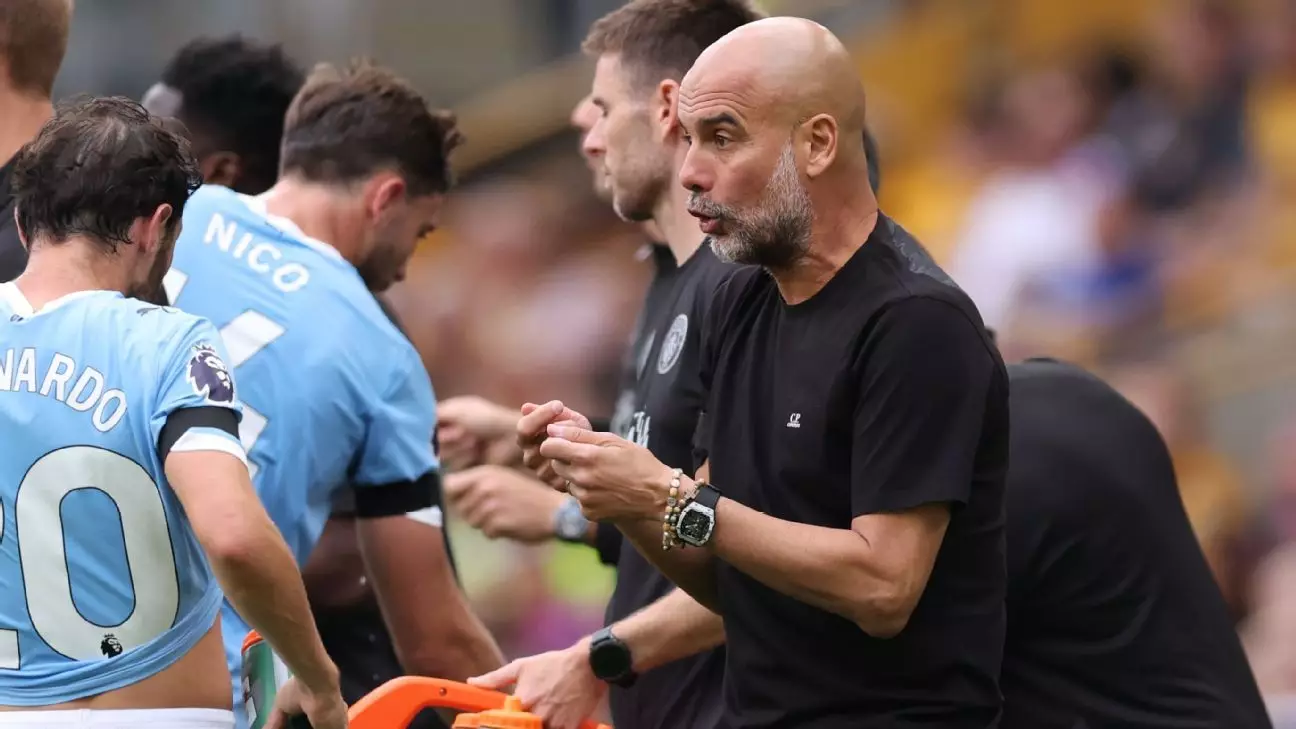Manchester City’s commanding 4-0 victory over Wolves at Molineux served as an encouraging start to their Premier League campaign. Erling Haaland’s brace and contributions from new signings Tijjani Reijnders and Rayan Cherki showcased an attacking dynamism that fans have long anticipated. Additionally, debutant goalkeeper James Trafford demonstrated commendable confidence, and Rayan Aït-Nouri’s performance—returning to Molineux after leaving this summer—added a layer of narrative and motivation to City’s overall performance. However, behind this positive façade lies a more pressing concern that could threaten the team’s long-term competitiveness: overpopulation of the squad.
Hostile Squad Depth: An Unhealthy Dilemma
Pep Guardiola’s candid remark—that Manchester City’s squad size is “not healthy”—reflects a deeper strategic issue that many top clubs face in the modern transfer era. While maintaining a large squad can be advantageous for competing on multiple fronts, excess can breed discord, diminish playing time for key players, and ultimately undermine team harmony. Guardiola’s frustration is rooted in an understanding that a cohesive, motivated environment is essential for sustained success. When players are sitting on the bench, especially in a highly competitive setup like City’s, it can create a negative atmosphere that hampers collective effort and diminishes the quality of training sessions.
This issue is compounded when the club holds a talent pool that’s too extensive, leading to difficult decisions about who stays and who departs. Guardiola’s desire to create a “deep squad”—one capable of fighting in all competitions—is natural, but only when managed with precision. The current situation suggests City might be attempting to balance growth with stability, yet their overstaffing problem is apparent. It’s clear that the club must streamline its roster to ensure every player feels valued and essential, rather than just filling squad quotas.
Transfer Strategies and Uncertain Futures
The ongoing saga surrounding goalkeeper Ederson exemplifies the complex balancing act at play. Despite intense speculation linking him with a move to Galatasaray or Paris Saint-Germain’s Gianluigi Donnarumma, Guardiola affirms that Ederson remains his “number one.” Yet, Ederson’s recent illness and not a transfer interest overshadow the narrative, indicating a fragile equilibrium. The Brazilian’s situation highlights that player confidence in the club’s long-term plans is vital; otherwise, uncertainty can undermine performance and morale.
Guardiola’s willingness to entertain potential departures, including the possibility of a future exit for Ederson, underscores the strategic reshuffling needed for squad optimization. With just two weeks left in the transfer window, City’s management faces the challenge of navigating negotiations delicately. They must balance the objective of reducing excess players with maintaining the squad’s integrity, all while satisfying the ambitions of both players and the club’s broader ambitions.
Balancing Performance with Preparation for the Road Ahead
Despite concerns about their squad size, Guardiola expressed satisfaction with the team’s opening performance, citing a positive first-half performance and effective transition play. His emphasis on utilizing the team’s notorious pace indicates a tactical focus on quick transitions and attacking efficiency. Reijnders’ debut—contributing to two Haaland goals—speaks to City’s successful integration of new talent. Yet, Guardiola also acknowledged areas for improvement, particularly maintaining consistency and tactical discipline throughout matches.
The victory over Wolves does not mean City is flawless, nor does it mask the fundamental issue of squad management. The pressure to win titles is relentless, and an overpopulated squad can be a liability rather than an asset if not managed effectively. The Coming weeks will test Guardiola’s leadership and vision as he seeks to trim the squad while maintaining peak competitiveness.
Strategic Implications for a Title-Contending Side
Manchester City’s aspirations for a seventh Premier League title in nine seasons remain intact, but the behind-the-scenes squad dilemmas could serve as stumbling blocks. Guardiola, one of football’s most tactically astute managers, has always prioritized a balanced, motivated squad. His comments make it clear that he values quality over quantity—yet managing the transition will be complex.
In essence, City’s robust start is overshadowed by the strategic necessity of trimming the squad and clarifying roles. Any misstep in this process could lead to fractured team chemistry or loss of key personnel. While the current squad has enough firepower to dominate domestically and challenge in Europe, their long-term success hinges on Guardiola’s ability to foster an environment of unity, motivation, and clarity—something that is challenging amid the pressures of the transfer window and a crowded roster.


Leave a Reply